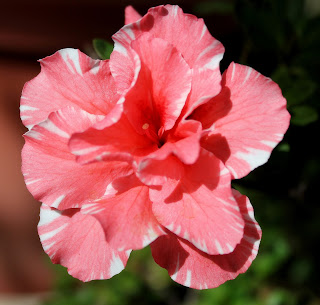 |
| Mary GrandPre |
On Saturday afternoon, Laure Ferlita and I attended a talk
by illustrator Mary GrandPre sponsored by our local arts council. Though
GrandPre is probably best known for her illustrations for the Harry Potter books, she’s illustrated seven picture books as well as created illustrations
for many editorial and advertising clients.
GrandPre was born in South Dakota, but her family moved to
Minnesota when she was still a baby. She began drawing at age 5, went through a
“Salvador Dali phase,” and later practiced drawing by copying black and white
photos from the encyclopedia. After attending the Minneapolis College of Art
and Design, she paid her dues waiting tables as she built her portfolio and
began to attract clients. Eventually she moved into illustrating children’s
books, and it was her first one, Chin Yu Min and the Ginger Cat, that
attracted the attention of executives at Scholastic, Inc., who were looking for
an illustrator for a book about a young wizard. At first she planned to turn
down the job because she was already busy, she told us, but after the publisher
encouraged her to read the manuscript, she changed her mind. As she told Communications Arts Magazine, “It sounded like
a nice job, so I said ‘sure.’ I
presented three cover sketches, they chose one, and I was pretty happy with
everything. They were great to work with, and I think I remember them saying
there might be more. At the time, it just seemed like another job.” GrandPre is
grateful for the popularity of Harry Potter, but she’s just as proud of (and
deservedly so) her other work, which includes The Noisy Paint Box, The Carnival of the Animals and Henry and Pawl and the Round Yellow Ball, a project she worked on with her husband, Tom.
 |
| Sketches from the creation of The Noisy Paint Box |
I knew nothing about the process of illustrating books, so I
was interested in how she described it. After researching her topic, she begins
sketching quickly, often using tracing paper and ink. Sometimes, she said, she
does get stuck, especially at the beginning of the process. She tries not to
get discouraged if she ends up with nothing usable after a day of work,
believing that there are no wasted days. “The next day will be better because
of today,” she said. After some back and forth with the art director of the
project, the sketches are finalized. She likes to have three to four months to
complete the final paintings. She has worked in pastels, acrylics, oils, and
charcoal, and has used collage in at least one of her projects.
I was impressed with how kindly and patiently she answered
audience questions that ranged from “How can I encourage my child who loves to
draw?” to “I’m writing a children’s book—how do I find a publisher?” After her
talk, we were able to examine some of her work close up, and it was beautiful.
She grew up attending Catholic school and church, and she mentioned that one of
her early influences was the glow of the light coming through stained glass
windows. I think that same glow fills her work.
GrandPre tries to do something different in each project.
It’s important to her to keep growing. “Artists need to take risks,” she said.
“I want to be challenged and try new things. If not, I’d rather wait on
tables.”
You can learn more about Mary GrandPre and see some of her
work on her website, marygrandpre.com.




















